六级听力新题型
2023年大学_大学英语四、六级考试新题型调整的说明
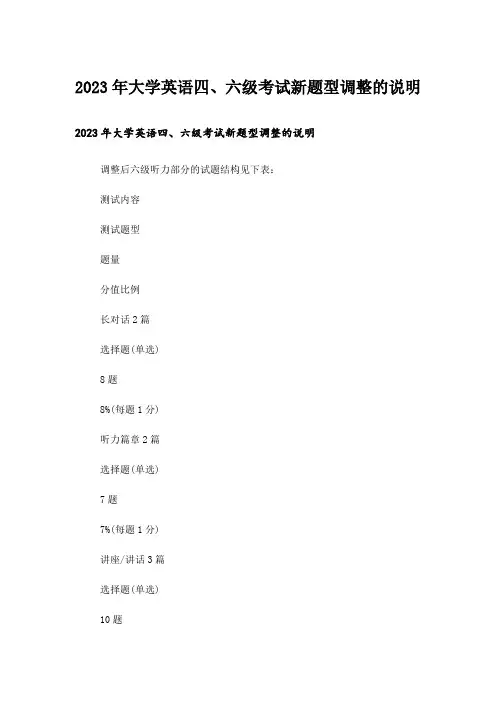
2023年大学英语四、六级考试新题型调整的说明2023年大学英语四、六级考试新题型调整的说明调整后六级听力部分的试题结构见下表:测试内容测试题型题量分值比例长对话2篇选择题(单选)8题8%(每题1分)听力篇章2篇选择题(单选)7题7%(每题1分)讲座/讲话3篇选择题(单选)10题20%(每题2分)1、六级听力之不变原来的长对话题型不变,依然是2篇。
但题目数量由7道题增至8题,依然每题1分;篇章听力题型不变,但题目数量由原来的3篇共10道题减少至2篇共7题,每题1分。
题型及难度没有变化,考生可参考旧题。
2、六级听力之变化短对话取消,听写取消。
增加讲座/讲话题型3篇共10道题,每题2分,是六级听力考试乃至全卷的关键。
下面我们就来详细解析一下新题型:Now listen to the following recording and answer questions 16 to 19.16. A) They investigate the retirement homes in America.B) They are on issues facing senior citizens in America.C) They describe the great pleasures of the golden years.D) They are filled with fond memories of his grandparents.17. A) The loss of the ability to take care of himself.B) The feeling of not being important any more.C) Being unable to find a good retirement home.D) Leaving the home he had lived in for 60 years.18. A) The loss of identity and self-worth.B) Fear of being replaced or discarded.C) Freedom from pressure and worldly cares.D) The possession of wealth and high respect.19. A) The urgency of pension reform.B) Medical care for senior citizens.C) Finding meaningful roles for the elderly in society.D) The development of public facilities for senior citizens.原文:Moderator:Hello Ladies and Gentleman, it gives me great pleasure to introduce our keynote speaker for todays session, Dr. Howard Miller. Dr. Miller, Professor of Sociology at Washington University, has written numerous articles and books on the issues facing older Americans in our graying society for the past 15 years. Dr. Miller:Dr. Miller: Thank you for that introduction. Today, Id like to preface my remarks with a story from my own life which I feel highlights the common concerns that bring us here together. Several years ago when my grandparents were well into their eighties, they were faced with the reality of no longer being able to adequately care for themselves. My grandfather spoke of his greatest fear, that of leaving the only home they had known for the past 60 years. Fighting back the tears, he spoke proudly of the fact that he had built their home from the ground up, and that he had pounded every nail and laid every brick in the process. The prospect of having to sell their home and give up their independence, and move into a retirement home was an extremely painful experience for them. It was,in my grandfathers own words, like having a limb cut off. He exclaimed in a forceful manner that he felt he wasnt important anymore.For them and some older Americans, their so-called “golden years”are at times not so pleasant, for this period can mean the decline of not only ones health but the loss of identity and self-worth. In many societies, this self-identity is closely related with our social status, occupation, material possessions, or independence. Furthermore, we often live in societies that value what is “new” or in fashion, and our own usage of words in the English language is often a sign of bad news for older Americans. I mean how would your family react if you came home tonight exclaiming, “Hey, come to the living room and see the OLD black and white TV I brought!” Unfortunately, the word “old” calls to mind images of the need to replace or discard.Now, many of the lectures given at this conference have focused on the issues of pension reform, medical care, and the development of public facilities for senior citizens. And while these are vital issues that must be addressed, Id like to focus my comments on an important issue that will affect the overall success of the other programs mentioned. This has to do with changing our perspectives on what it means to be a part of this group, and finding meaningful roles the elderly can play and should play in our societies.First of all, Id like to talk about . . .16. What does the introduction say about Dr. Howard Millers articles and books?17. What is the greatest fear of Dr. Millers grandfather?18. What does Dr. Miller say the “golden years” can often mean?19. What is the focus of Dr. Millers speech?解:这是一篇关于老龄化社会,老年人的晚年生活等问题的演讲。
英语六级听力新题型揭秘,附难点突破与蒙题技巧
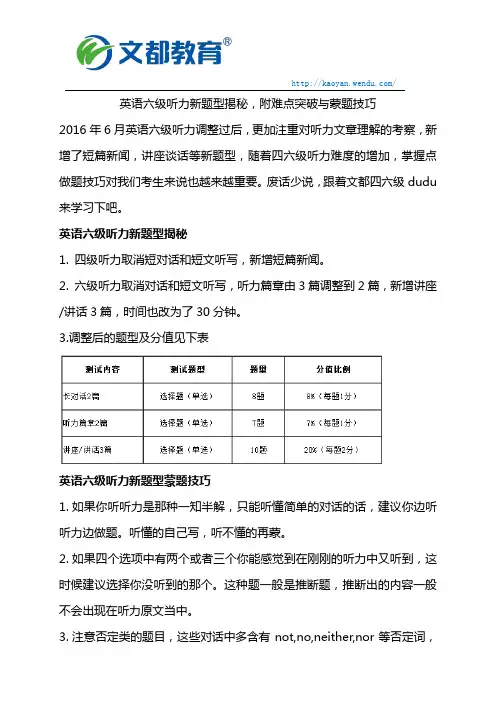
/英语六级听力新题型揭秘,附难点突破与蒙题技巧2016年6月英语六级听力调整过后,更加注重对听力文章理解的考察,新增了短篇新闻,讲座谈话等新题型,随着四六级听力难度的增加,掌握点做题技巧对我们考生来说也越来越重要。
废话少说,跟着文都四六级dudu 来学习下吧。
英语六级听力新题型揭秘1. 四级听力取消短对话和短文听写,新增短篇新闻。
2. 六级听力取消对话和短文听写,听力篇章由3篇调整到2篇,新增讲座/讲话3篇,时间也改为了30分钟。
3.调整后的题型及分值见下表英语六级听力新题型蒙题技巧1.如果你听听力是那种一知半解,只能听懂简单的对话的话,建议你边听听力边做题。
听懂的自己写,听不懂的再蒙。
2.如果四个选项中有两个或者三个你能感觉到在刚刚的听力中又听到,这时候建议选择你没听到的那个。
这种题一般是推断题,推断出的内容一般不会出现在听力原文当中。
3.注意否定类的题目,这些对话中多含有not,no,neither,nor等否定词,/也有but,although等转折词,或由would rather,too...to结构及虚拟语气等表达。
要注意这些答案表达的都是否定含义,所以如果你看到了和你听到原文基本相同的语句,但是多了一个上述词汇,一定要首先排除,然后你把否定词删去,找其余答案中跟这句话意思相近的,基本就是正确答案了。
4.如果一题的答案中有两个答案是近似的,只有一个单词或者短语不同,那么你可排除其余答案,再看这两个答案中的中心单词有没有和你排除的两个答案中重复的,如果有的话,你基本可以锁定那个正确答案了。
5.有些听力实在不好,听了还不如不听的,建议还是不要浪费时间了,多留点时间给后面的题,提高后面题的准确性是更好的选择。
完全不听听力来蒙题的话大部分题只能给你排除一些选项。
英语四六级想过找文都。
六级听力模拟题
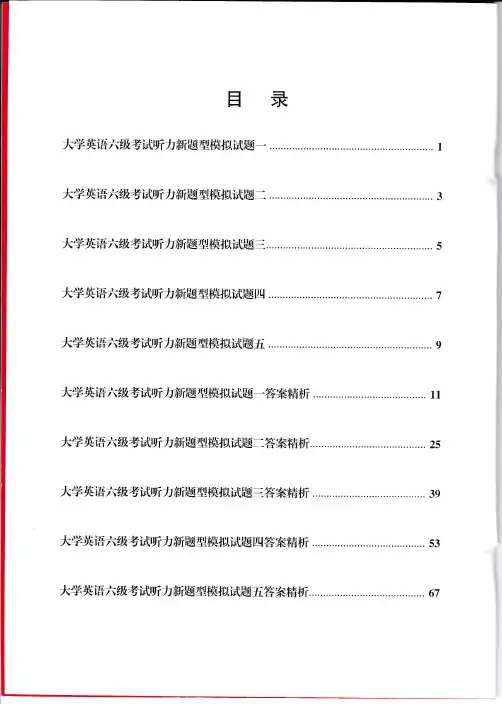
大学英语六级考试昕力新题型模拟试题四Part II Section A Listening Comprehension (30 minutes)Directions: In this section, you will hear two long conνersations. At the end of each conνersation, you will hear some questions. Both the conversation and the questions will be spoken on抄once.A卢er you hear a question, you must choose the best answer from the four choices marked A), B ), C) and D ). Then mark the corresponding letteron Answer Sheet 1 with a single line through the centre.Conversation OneQuestions 1 to 4 are based on the conversation you have just heard.L A) To app l y for a student loan.C)To ask for a letter of recommendation.B)To discuss a decision be has to make.D)To也1d out which colleges accepted him.2.A) The laboratories are not well equipped.C)It’s too expensive.B)The classes are too larg巳D)It’s too far away仕om home.3.A) It has a b巳autiful campus.C)It’s in an urban s巳仕ing.B) Professors regularly p ublish their academic results. D) Faculty members interact with students.4.A) H e is outgoing.C) H e is troublesome.B) H e is handsome.D) H e is honest.Conversation TwoQuestions 5 to 8 are based on the conversation you have just heard.5.A) B ecause she is Professor B ill's daughter.B) B ecause she works part-t ime as Professor Bill’s secr巳tary.C)B巳cause she us巳d to do the j ob hers巳lf.D) B ecause sh巳just came out of an interview for the job.6.A) It should be higher.·C) It’s the same as that of school post office.B)It’s very good.D)It varies according to the person’s experience.7.A) Make up homework problem sets.C)Teach an economics courseB)Do r巳search in the laboratory.D)Grade hom巳work sets.8.A) H e wonders if he'll have enough time to do the job.B) H e is afraid he doesn't know enough to do the j ob well.C) H e fears that the j ob may be too boring.D) H e think:s Professor B ill has someone else in mind.Section BDirections: In this section, you will hear two passages. At the end of each passage, you will hear some questions. Both the passage and the questions will be spoken only once. After you hear a question, you must choose the best answer j于om the four choices marked A),肘,C)and D ). Then mark the corresponding letter on Answer Sheet 1 with a single line through the centre.Passage OneQuestions 9 to 11 are based on the passage you have just heard.9. A) H e was not interested in political reform. C) H e had no political experience.B)H巳had an unusual military career.D) H e expressed many controversial ideas.10.A) B巳cause he was well known on the West Coast. C) B ecause he supported fi n ancial aid to farmers.B) B ecaus巳he served as James Polk’s Vice President D) B ecause he was a popular war hero.11.A) H e lost th巳support of farmers.C) H e died early in his t巳rm.B) H e was opposed by the Whig party.D) H e came into confl i ct with railroad owners. Passage TwoQuestions 12 to 15 are based on the passage you have just heard.12.A) All the wasps.C)The female wasp.B)The male wasp.D)The new offspring.7。
大学英语六级新题型听力解读
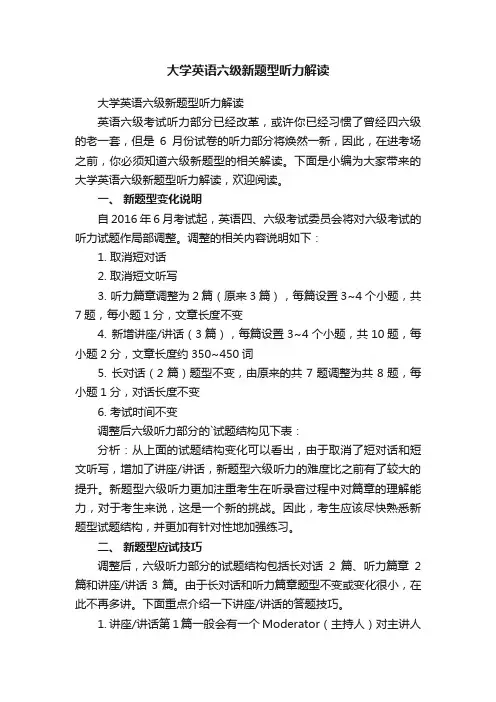
大学英语六级新题型听力解读大学英语六级新题型听力解读英语六级考试听力部分已经改革,或许你已经习惯了曾经四六级的老一套,但是6月份试卷的听力部分将焕然一新,因此,在进考场之前,你必须知道六级新题型的相关解读。
下面是小编为大家带来的大学英语六级新题型听力解读,欢迎阅读。
一、新题型变化说明自2016年6月考试起,英语四、六级考试委员会将对六级考试的听力试题作局部调整。
调整的相关内容说明如下:1. 取消短对话2. 取消短文听写3. 听力篇章调整为2篇(原来3篇),每篇设置3~4个小题,共7题,每小题1分,文章长度不变4. 新增讲座/讲话(3篇),每篇设置3~4个小题,共10题,每小题2分,文章长度约350~450词5. 长对话(2篇)题型不变,由原来的共7题调整为共8题,每小题1分,对话长度不变6. 考试时间不变调整后六级听力部分的`试题结构见下表:分析:从上面的试题结构变化可以看出,由于取消了短对话和短文听写,增加了讲座/讲话,新题型六级听力的难度比之前有了较大的提升。
新题型六级听力更加注重考生在听录音过程中对篇章的理解能力,对于考生来说,这是一个新的挑战。
因此,考生应该尽快熟悉新题型试题结构,并更加有针对性地加强练习。
二、新题型应试技巧调整后,六级听力部分的试题结构包括长对话2篇、听力篇章2篇和讲座/讲话3篇。
由于长对话和听力篇章题型不变或变化很小,在此不再多讲。
下面重点介绍一下讲座/讲话的答题技巧。
1. 讲座/讲话第1篇一般会有一个Moderator(主持人)对主讲人的背景等相关情况进行介绍,其所说的话中一般会设置一道题,注意听清主讲人的相关情况。
2. 与听力篇章差不多,讲座/讲话部分的大多数题目都是细节题或推断题,应特别留意文章中表示时间、地点、年代、数字、事物特征、事物优缺点、原因、结果、目的等内容。
3. 要特别注意表示主讲人观点态度的地方,这些地方很容易设置观点态度题。
4. 要特别注意文章开头及结尾,这两个地方很容易设置主旨大意题。
最新四六级新增试题

四六级新增试题六级听力新增样题分析@欧阳萍老师2022年12月30日晚间,四六级官方网站发布听力局部改革信息,具体情况为:六级听力占全卷比例35%,总比例不变。
长对话两段,占比8%〔旧题型〕;短文听力两篇,占比7%〔旧题型〕;讲座/演讲三篇 占比20%〔新增,每题2%〕。
也就是说,六级听力考试新增了演讲/讲话。
六级听力新增题解析Now listen to the following recording and answer questions 16 to 19.16.A) They investigate the retirement homes in America.B) They are on issues facing senior citizens in America.C) They describe the great pleasures of the golden years.D) They are filled with fond memories of his grandparents.17.A) The loss of the ability to take care of himself.B) The feeling of not being important any more.C) Being unable to find a good retirement home.D) Leaving the home he had lived in for 60 years.18.A) The loss of identity and self-worth.B) Fear of being replaced or discarded.C) Freedom from pressure and worldly cares.D) The possession of wealth and high respect.19.A) The urgency of pension reform.B) Medical care for senior citizens.C) Finding meaningful roles for the elderly in society.D) The development of public facilities for senior citizens.【解析】16,考察视听一致+同义替换 senior citizens〔老年人〕= older Americans,视听一致,视听一致,视听一致。
新题型大学英语六级听力训练
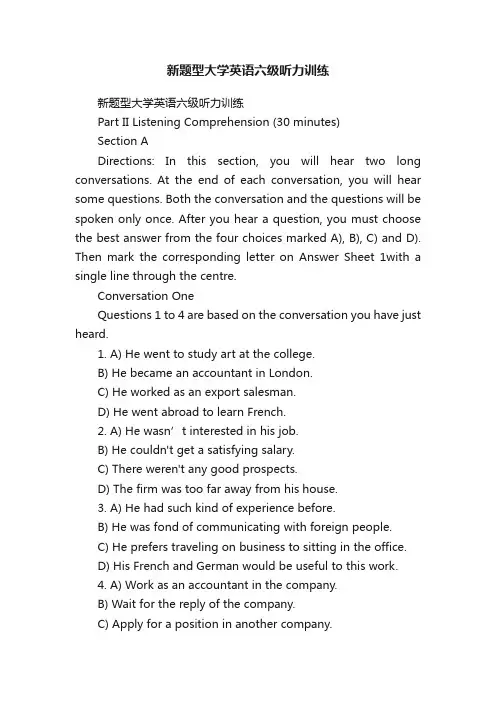
新题型大学英语六级听力训练新题型大学英语六级听力训练Part II Listening Comprehension (30 minutes)Section ADirections: In this section, you will hear two long conversations. At the end of each conversation, you will hear some questions. Both the conversation and the questions will be spoken only once. After you hear a question, you must choose the best answer from the four choices marked A), B), C) and D). Then mark the corresponding letter on Answer Sheet 1with a single line through the centre.Conversation OneQuestions 1 to 4 are based on the conversation you have just heard.1. A) He went to study art at the college.B) He became an accountant in London.C) He worked as an export salesman.D) He went abroad to learn French.2. A) He wasn’t interested in his job.B) He couldn't get a satisfying salary.C) There weren't any good prospects.D) The firm was too far away from his house.3. A) He had such kind of experience before.B) He was fond of communicating with foreign people.C) He prefers traveling on business to sitting in the office.D) His French and German would be useful to this work.4. A) Work as an accountant in the company.B) Wait for the reply of the company.C) Apply for a position in another company.D) Go abroad to be an export salesman.Conversation TwoQuestions 5 to 8 are based on the conversation you have just heard.5. A) None of them has canoed before.B) They can dive when it's hot.C) There are many rapids in the river.D) They will go canoeing by themselves.6. A) Bring cookout for Friday night.B) Set up the tents for Saturday.C) Supply breakfast on Sunday morning.D) Offer food and drinks for Saturday night.7. A) She will prepare food when they go canoeing.B) She’ll be the trip l eader when they go canoeing.C) She has no car and wants to borrow one.D) She wants Neal to drive them to the meeting place.8. A) The woman has failed the finals.B) The man has never gone canoeing.C) The woman loves camping and sleeping out.D) The man will not go canoeing with the woman.Section BDirections: In this section, you will hear two passages. At the end of each passage, you will hear some questions. Both the passage and the questions will be spoken only once. After you hear a question, you must choose the best answer from the four choices marked A), B), C) and D). Then mark the corresponding letter on Answer Sheet 1 with a single line through the centre.Passage OneQuestions 9 to 12 are based on the passage you have just heard.9. A) Sympathetic. B) Doubtful. C) Subjective. D) Objective.10. A) Between 800 BC and 600 BC. B) Between 700 AD and 800 AD.C) Between 600 AD and 700 AD. D) Between 800 BC and 700 BC.11. A) Each work was a collection of several poems by several Greek authors.B) Each work was a collection of several essays by several Roman authors.C) Both of them could have been the work of a single poetic genius.D) One of them could have been the work of a single poetic genius.12. A) He was the poet of The Iliad and The Odyssey.B) He was the representative of the Analysts.C) He was the representative of the Unitarian.D) His ideas about Homer have great influence.Passage TwoQuestions 13 to 15 are based on the passage you have just heard.13. A) There are too many people seeking employment.B) A more serious economic crisis is coming soon.C) Jobs created by economic progress are insufficient.D) More and more old people are unemployed.14. A) Sub-Saharan Africa and Europe.B) East and South Asia.C) The continent of North America.D) The continent of South America.15. A) Youth unemployment worldwide is over 30 percent.B) Young people are the particular victims of unemployment.C) Female unemployment is a major concern in the world.D) Most unemployed people are aged between 14 and 25.Section CDirections: In this section, you will hear recordings of lectures or talks followed by some questions. The recordings will be played only once. After you hear a question, you must choose the best answer from the four choices marked A), B), C) and D). Then mark the corresponding letter on Answer Sheet 1 with a single line through the centre. Now listen to the following recording and answer questions 16 to 19.16. A) Lords, vassals and fiefs.B) Warriors, lords and vassals.C) King, vassals and fiefs.D) King, lords and warriors.17. A) A person who acts as counselors.B) A person who owns land.C) A person who guarantees the security.D) A person who governs the country.18. A) They would lend their lands to the vassals.B) They would ask the vassals to help make decisions.C) They would provide suggestions to their superiors.D) They would harvest crops from their lands.19. A) The lord. B) The vassal.C) The aristocrat. D) The emperor.Now listen to the following recording and answer questions 20 to 22.20. A) The seasons in the city. B) The popular activities in the city.C) The scenic spots of the city. D) The temperature of the city.21. A) Around 29 degrees. B) Around 40 degrees.C) Around 10 degrees. D) Around 30 degrees.22. A) Go on picnics and play outdoor games.B) Go hiking, fishing and camping.C) Clean up their yards and gardens.D) Go to the parks and fly kites.Now listen to the following recording and answer questions 23 to 25.23. A) Coca-Cola. B) McDonalds. C) Disney. D) Mickey Mouse.24. A) His ability to draw particularly well.B) His insight and management ability.C) His ability to identify with the audiences.D) His ability to create new things.25. A) He made films to train American soldiers.B) He worked for the FBI as a mole.C) He was a role model to the filmmakers.D) He entertained the world all his life.。
CET6听力改革(新题型)
第 1 页
重庆科技学院大学英语六级提高班
第 2 页
重庆科技学院大学英语六级提高班
第 3 页
重庆科技学院大学英语六级提高班
第 4 页
重庆科技学院大学英语六级提高班
第 5 页
重庆科技学院大学英语六级提高班
第 6 页
重庆科技学院大学英语六级提高班
第 7 页
重庆科技学院大学英语六级提高班
第 8 页
重庆科技学院大学英语六级提高班
第 10 页
重庆科技学院大学英语六级提高班
第 11 页
重庆科技学院大学英语六级提高班
第 12 页
重庆科技学院大学英语六级提高班
第 13 页
重庆科技学院大学英语六级提高班
第 14 页
重庆科技学院大学英语六级提高班
第 15 页
重庆科技学院大学英语六级提高班
第 16 页
大学英语六级考试听力理解部分主要涉及三种题型
大学英语六级考试听力理解部分主要涉及三种题型(新题型听写填空spot dictation主要作为四级题型公布),题型不同,命题要求也不同,其答题时的方法技巧自然也应有所不同,本章就从不同题型的角度再介绍一些答题要点。
一、简短会话大学英语六级考试中,简短对话是听力理解题中必考的,共10题,占分10%,内容比四级的长而复杂,要求考生在两题的间隙迅速选定答案,并准备听下一题。
近几年来六级考试听力部分试题从问题类型上看,已基本取消有关“时间”、“地点”、“人物身份”、“对话双方关系”、“数学计算”等意念的题型,而代之以会话“主题”、“重点概括”、“暗示推论”、“语气态度”等涉及会话整体话题要求较高层次理解的题型。
我们留意到,近几年来六级这部分听力题的问题大多是以下几种模式:1.what do we learn/can be learned from the conversation?2.what are they talking about?3.what does the man/woman mean/imply?4.what’s the man’s/woman’s opinion about...?5.how does the man/woman feel about...?6.what will the man/woman/mr...probably do?鉴于这样的试题特征,我们在应试时要注意以下几点:1.在分析预测的前提下,尽量把对话双方的话语听完整,而不要像四级一样仅关注第二个对话者的内容。
2.注意正确答案的特点。
一般有以下几种情况:①与听力原文的部分内容一致;②是对话某方语气、态度的描述,这样的题目要特别注意说话者所用的句子重音和语调;③与听力原文整个内容相一致,要求在概括归纳的基础上得出;④是听力原文的延伸和推断,注意推断时必须忠实于原文,当然也不必丝毫不差地再现原文,答案只要能表达原文中部分信息,甚至可不包含原文表层信息,但必须是原文的实质。
大学英语四六级新题型听力考试说明及新题型听力样题
大学英语四六级听力考试说明原四六级听力题型一、四级听力试题的调整1.取消短对话2.取消短文听写3.新增短篇新闻(3段)其余测试内容不变。
2016年6月四级听力题型调整后四级听力部分的试题结构见下表:2016年6月四级听力短篇新闻的考试指令:Section ADirections: In this section, you will hear three news reports. At the end of each news report, you will hear two or three questions. Both the news report and the questions will be spoken only once. After you hear a question, you must choose the best answer from the four choices marked A), B), C) and D). Then mark the corresponding letter on Answer Sheet 1 with a single line through the centre.二、六级听力试题的调整1.取消短对话2.取消短文听写3.听力篇章调整为2篇(原3篇)4.新增讲座/讲话(3篇)其他测试内容不变。
2016年6月四级听力题型调整后六级听力部分的试题结构见下表:Section CDirections: In this section, you will hear recordings of lectures or talks followed by some questions. The recordings will be played only once.After you hear a question, you must choose the best answer from the four choices marked A), B), C) and D). Then mark the corresponding letter on Answer Sheet 1 with a single line through the centre.四级听力样题Questions 1 and 2 will be based on the following news item.Kenyan police say one person was killed and 26 injured in an explosion at a bus station in central Nairobi. The blast hit a bus about to set off for the Ugandan capital Kampala. Last July, the Somali group al-Shabab said it was behind the blasts in the Ugandan capital which killed more than 70 people. Will Ross reports from the Kenyan capital.The explosion happened beside a bus which was about to set off for an overnight journey from Nairobi to the Ugandan capital Kampala. Some eyewitnesses report that a bag was about to be loaded on board, but it exploded during a security check. Windows of the red bus were left smashed, and blood could be seen on the ground beside thevehicle. Just hours earlier, Uganda’s police chief had warned of possible Christmas-time attacks by Somali rebels.1. What is the news report mainly about?2. When did the incident occurQuestions 1 and 2 will be based on the following news item.Christmas-time attacks made by Somali rebels.B) An explosion at a bus station in central Nairobi.C) The killing of more than 70 Ugandans in Kampala.D) Blasts set off by a Somali group in Uganda’s capita l.On Christmas Eve. C) During a security check.B) Just before midnight. D) In the small hours of the morning.Questions 3 and 4 will be based on the following news item.Woolworths is one of the best known names on t he British High Street. It’s been in business nearly a century. Many of its 800 stores are likely to close following the company’s decision to call in administrators after an attempt to sell the business for a token £1 failed.The company has huge debts. T he immediate cause for the collapse has been Britain’s slide toward recession, which has cut into consumer spending. However, the business had been in trouble for years.Known for low-priced general goods, Woolworths has struggled in the face of competition from supermarkets expanding beyond groceries and a new generation of internet retailers.Many of the store group’s 25,000 employees are likely to lose their jobs. Some profitable areas such as the DVD publishing business will survive.3. What do we learn about Woolworths from the news report?4. What did Woolworths attempt to do recentlyQuestions 3 and 4 will be based on the following news item.3. A) It is likely to close many of its stores.B) It is known for the quality of its goods.C) It remains competitive in the recession.D) It will expand its online retail business.4. A) Expand its business beyond groceries.B) Fire 25,000 of its current employees.C) Cut its DVD publishing business.D) Sell the business for one pound.Questions 5 to 7 will be based on the following news item.Cairo is known for its overcrowded roads, irregular driving practices and shaky old vehicles, but also for its air pollution. In recent months, though, environmental studies indicate there have been signs of improveme nt. That’s due in part to the removal of many of the capital’s old-fashioned black and white taxis. Most of these dated back to the 1960s and 70s and were in a poor state of repair.After new legislation demanded their removal from the roads, a low interest loan scheme was set up with three Egyptian banks so drivers could buy new cars. The government pays about $900 for old ones to be discarded and advertising on the new vehicles helps cover repayments.The idea has proved popular with customers ― they can now travel in air-conditioned comfort and because the new cabs are metered, they don’t have to argue over fares. Banks and car manufacturers are glad for the extra business in tough economic times. As for the taxi drivers, most are delighted to be behind the wheel of new cars, although there have been a few complaints about switching from black and white to a plain white colour.5. What change took place in Cairo recently?6. What helped bring about the change?7. Why do customers no longer argue with new cab driversQuestions 5 to 7 will be based on the following news item.5. A) All taxis began to use meters.B) All taxis got air conditioning.C) Advertisements were allowed on taxis.D) Old taxis were replaced with new cabs.6. A) A low interest loan scheme. C) Taxi passengers’ complaints.B) Environmentalists’ protests. D) Permission for car advertising.7. A) There are no more irregular practices.B) All new cabs provide air-conditioning.C) New cabs are all equipped with meters.D) New legislation protects consumer rights.Section A1. B2. C3. A4. D5. D6. A7. C六级听力样题Now listen to the following recording and answer questions 16 to 19.Moderator (会议主持人):Hello Ladies and Gentleman, it gives me great pleasure to introduce our keynote speaker for today’s session, Dr. Howard Miller. Dr. Miller, Professor of Sociologyat Washington University, has written numerous articles and books on the issues facing older Americans in our graying society for the past 15 years. Dr. Miller: Dr. Miller:Thank you for that introduction. Today, I’d like to preface my remarks with a story from my own life which I feel highlights the common concerns that bring us here together. Several years ago when my grandparents were well into their eighties, they were faced with the reality of no longer being able to adequately care for themselves. My grandfather spoke of his greatest fear, that of leaving the only home they had known for the past 60 years. Fighting back the tears, he spoke proudly of the fact that he had built their home from the ground up, and that he had pounded every nail and laid every brick in the process. The prospect of having to sell their home and give up their independence, and move into a retirement home was an extremely painful experience for them. It was, in my grandfather’s own words, like having a limb cut off. He exclaimed in a forceful manner that he felt he wasn’t important anymore. For them and some older Americans, their so-called “golden years” are at times not so pleasant, for this period can mean the decline of not only one’s health but the loss of identity and self-worth. In many societies, this self-identity is closely related with our social status, occupation, material possessions, or independence. Furthermore, we often live in societies that value what is “new” or in fashion, and our own usage of words in the English language is often a sign of bad news for older Americans. I mean how would your family react if you came home tonight exclaiming, “Hey, come to the living room and see the OLD black and white TV I brought!” Unfortunately, the word “old” calls to mind images of the need to replace or discard.Now, many of the lectures given at this conference have focused on the issues of pension reform, medical care, and the development of public facilities for senior citizens. And while these are vital issues that must be addressed, I’d like to focusmy comments on an important issue that will affect the overall success of the other programs mentioned. This has to do with changing our perspectives on what it means to be a part of this group, and finding meaningful roles the elderly can play and should play in our societies.First of all, I’d like to talk about . . .16. What does the introduction say about Dr. Howard Miller’s articles and books?17. What is the greatest fear of Dr. Miller’s grandfather?18. What does Dr. Miller say the “golden years” can of ten mean?19. What is the focus of Dr. Miller’s speechNow listen to the following recording and answer questions 16 to 19.16. A) They investigate the retirement homes in America.B) They are on issues facing senior citizens in America.C) They describe the great pleasures of the golden years.D) They are filled with fond memories of his grandparents.17. A) The loss of the ability to take care of himself.B) The feeling of not being important any more.C) Being unable to find a good retirement home.D) Leaving the home he had lived in for 60 years.18. A) The loss of identity and self-worth.B) Fear of being replaced or discarded.C) Freedom from pressure and worldly cares.D) The possession of wealth and high respect.19. A) The urgency of pension reform.B) Medical care for senior citizens.C) Finding meaningful roles for the elderly in society.D) The development of public facilities for senior citizens.Now listen to the following recording and answer questions 20 to 22.20. A) It seriously impacts their physical and mental development.B) It has become a problem affecting global economic growth.C) It is a common problem found in underdeveloped countries.D) It is an issue often overlooked by parents in many countries.21. A) They will live longer. C) Theyget along well with people.B) They get better pay. D) Theydevelop much higher IQs.22. A) Appropriated funds to promote research of nutrient-rich foods.B) Encouraged breastfeeding for the first six mo nths of a child’s life.C) Recruited volunteers to teach rural people about health and nutrition.D) Targeted hunger-relief programs at pregnant women and young children.Now listen to the following recording and answer questions 20 to 22.The 2010 Global Hunger Index report was released today by the International Food Policy Research Institute (IFPRI). It notes that, in recent years, experts have come to the conclusion that undernourishment between conception and a child’s second birthday can have serious and long-lasting impacts.Undernourishment during this approximately 1,000-day window can seriously check the growth and development of children and render them more likely to get sick and die than well-fed children. Preventing hunger allows children to develop both physically and mentally.Says IFPRI’s Marie Ruel, “They will be more likely to perform well in school. They will stay in school longer. And then at adulthood, IFPRI has actually demonstrated that children who were better nourished have higher wages, by a pretty large margin, by 46 percent.”Ruel says that means the productivity of a nation’s future generations depends in a large part on the first 1,000 days of life.“This is why we’re all on board in focusing on those thousand days to improve n utrition. After that, the damage is done and is highly irreversible.”The data on nutrition and childhood development has been slowly coming together for decades. But Ruel says scientific consensus alone will not solve the problem. “It’s not enough that nutritionists know you have to intervene then, if we don’t have the politicians on board, and also the...people that implement [programs] in the field.”Ruel says there are encouraging signs that politicians and implementers are beginning to get on board. Many major donors and the United Nations are targeting hunger-relief programs at pregnant women and young children. They focus on improving diets or providing micro-food supplements. They improve access to pre-birth care and encourage exclusive breastfeedin g for the first six months of a child’s life. Ruel says in the 1980s Thailand was able to reduce child undernourishment by recruiting a large number of volunteers to travel the countryside teaching about health and nutrition.“They really did very active promotion of diversity in the diet and good eating habits. So they were providing more food to people, but also educating people on how to use them, and also educating people on how to feed their young children.”Ruel says countries may take different approaches to reducing child undernutrition. But she says nations will not make progress fighting hunger and poverty until they begin to focus on those critical first thousand days.20. What is the experts’ conclusion regarding children’s undernourishment in t heir earliest days of life21. What does IFPRI’s Marie Ruel say about well-fed children in their adult life?22. What did Thailand do to reduce child undernourishment in the 1980sNow listen to the following recording and answer questions 23 to 25.I’d like to look at a vital aspect of e-commerce, and that is the nature of the product or service. There are certain products and services that are very suitable for selling online, and others that simply don’t work.Suitable products generally have a high value-to-weight ratio. Items such as CDs and DVDs are obvious examples. Books, although heavier and so more expensive to post, still have a high enough value-to-weight ratio, as the success of Amazon, which started off selling only books, shows. Laptop computers are another good product for selling online.Digital products, such as software, films and music, can be sold in a purely virtual environment. The goods are paid for by online transactions, and then downloaded onto the buyer’s computer. There are no postage or delivery costs, so prices can be kept low.Many successful virtual companies provide digital services, such as financial transactions, in the case of Paypal, or means of communication, as Skype does. The key to success here is providing an easy-to-use, reliable service. Do this and you can easily become the market leader, as Skype has proved.Products which are potentially embarrassing to buy also do well in the virtual environment. Some of the most profitable e-commerce companies are those selling sex-related products or services. For a similar reason, online gambling is highly popular.Products which are usually considered unsuitable for selling online include those that have a taste or smell component. Food, especially fresh food, falls into this category, along with perfume. Clothes and other items that need to be tried on such as diamond rings and gold necklaces are generally not suited to virtual retailing, and, of course, items with a low value-to-weight ratio.There are exceptions, though. Online grocery shopping has really taken off, with most major supermarkets offering the service. The inconvenience of not being ableto see the food you are buying is outweighed by the time saved and convenience of having the goods delivered. Typical users of online supermarkets include the elderly, people who work long hours and those without their own transport.23 What is important to the success of an online store?24. What products are unsuitable for selling online?25. Who are more likely to buy groceries onlineNow listen to the following recording and answer questions 23 to 25.23. A) The guaranteed quality of its goods.B) The huge volume of its annual sales.C) The service it provides to its customers.D) The high value-to-weight ratio of its goods.24. A) Those having a taste or smell component.B) Products potentially embarrassing to buy.C) Those that require very careful handling.D) Services involving a personal element.25. A) Those who live in the virtual world.B) Those who have to work long hours.C) Those who are used to online transactions.D) Those who don’t mind paying a little more.Section C16. B 17. D18. A 19. C20. A21. B 22. C23. D 24. A25. B。
2021年英语六级考试听力新题型解读
2021年英语六级考试听力新题型解读一、听力理解题型解读听力部分旨在通过听力的方式考查考生对于校园生活,日常一、听力理解题型解读听力部分旨在通过听力的方式考查考生对于校园生活,日常交际以及一些科普与历史文化信息获取和判断推理能力,从而测试考生的听力与综合理解能力。
听力部分的录音材料均为标准的英音和美音朗读,语速约为每分钟150个单词,属于正常语速。
考试时间为35分钟,分值占六级考试总分的35%。
共分为三个部分:对话部分,包括短对话和长对话,占分值的15%;短文理解部分,占分值的10%;复合式听写部分,占分值的10%。
(一)对话部分短对话与长对话均采用选择题的形式进行考查,短对话共8组,每组为一轮对话和一个问题,长对话共两段,每段为7-8轮对话,后面有3-4个问题。
每个问题后有13秒的答题时间。
考试时对话内容和问题均只读一遍。
(二)短文部分通常由3篇文章组成,每篇240-260个单词,每篇后面有3-4题,共10题。
每个问题后也是有13秒的答题时间。
考试时短文内容和问题也只读一遍。
(三)复合式听写主要包括单词听写与句子或从句听写两种考查方式,从不同层面考查了考生的听力理解、文意把握以及词汇速记等综合能力,属于新题型,文章为240-260字,前8个空要求准确填入所缺单词,后三个空格较长,要求考生将所听到的内容用原文或自己的话表达出来。
考试时全文朗读三遍,第一遍朗读时中间没有停顿,要求考生听懂全文大意;第二遍朗读时,在每个空格所在句的后面都有停顿,以便考生可以填写所缺内容;第三遍朗读时没有停顿,目的是供考生校对所填内容。
二、应试要点与解题技巧(一)改革后听力理解的要求听力理解部分测试学生获取口头信息的能力,包括理解主旨大意、重要事实和细节、隐含意义,判断话语的交际能力、说话人的观点、态度等。
大学英语六级考试听力理解部分要求考生达到《教学要求》中较高要求,即"能基本听懂英语国家人士的谈话和讲座,能听懂题材熟悉、篇幅较长的国内英语广播或电视节目,语速为每分钟150词左右,能掌握其中大意,抓住要点和相关细节。
- 1、下载文档前请自行甄别文档内容的完整性,平台不提供额外的编辑、内容补充、找答案等附加服务。
- 2、"仅部分预览"的文档,不可在线预览部分如存在完整性等问题,可反馈申请退款(可完整预览的文档不适用该条件!)。
- 3、如文档侵犯您的权益,请联系客服反馈,我们会尽快为您处理(人工客服工作时间:9:00-18:30)。
Section AConversation One1. A. It is getting things done through other people.B. It is helping an organization find the right staff.C. It is assembling people of different abilities.D. It is communicating between colleagues.2. A. Developing plans to co-ordinate activities. C. Determing what tasks to be done.B. Selecting the communication channels. D. Correcting significant deviations.3. A. They should be avoided by all means. C. They can be good for an organization.B. They are bad for effective management. D. They are surprisingly complicated.4. A. Delegation is a ticket to foreign trade.B. Managers shouldn't merely be a "doer".C. Leadership is a born ability.D. Delegation is the most important thing in management.Conversation Two5. A. Many of her books are bestsellers. C. She is promoting her book in person.B. She is a shrewd bookstore owner. D. She is a salesperson at the bookstore.6. A. It has been the bestseller for weeks. C. It is being sold at a very low price.B. It advises people to change themselves. D. It distinguishes cooperators.7. A. A man careful with money. C. A noisy reader.B. A book-lover. D. A trouble-maker.8. A. Someone who always talks about himself. C. Someone who stabs your back.B. The most violent type of co-workers. D. The most common annoying type of people. Section BPassage One9. A. He worked in a supermarket for tuition.B. He helped someone to learn to read.C. He gave single mothers the help that they needed.D. He went to a training program to help a volunteer.10. A. She knew where the goods were in the supermarket.B. She asked others to take her to the right place.C. She managed to find the goods by their looks.D. She remembered the names of the goods.11. A. Marie benefited a lot from the practical lessons.B. Marie was able to read stories with the help of her son.C. Marie decided to continue her studies in school.D. Marie found her lessons more challenging than her children's.Passage Two12. A. They were controlled less strictly by the authorities.B. They treated their workers more humanely.C. They completely ignored consumers' health.D. They turned out more unhealthy products at will.13. A. Paid much attention to the results of scientific discoveries.B. Seldom introduced safety laws before disasters occurred.C. Hardly ever looked into the causes of tragedies.D. Imposed safety rules as soon as accidents took place.14. A. There are altogether three departments which protect customers and workers.B. A company with poor or dangerous working conditions is likely to be punished.C. Stores dealing in foods and drugs are controlled by the local government.D. The protection of workers' health and safety is still not well ensured.15. A. Industries in the past and the present.B. Changes in the development of industries.C. The protection of industrial workers and customers.D. The freedom of industries today and in the past.Section CNow listen to the following recording and answer questions 16 to 19.16. A. Making small talks with many people. C.Talking to only a small group of people.B. Staying till very late in the large party. D. Having conversations on different topics.17. A quiet and confident. C. Shy and energetic.B. Bold and loud. D. Tricky and timid.18. A. They are always alone by themselves. C. They do not like socializing with people.B. They are tired of charging their batteries. D. They need time to prepare for social activities.19. A. Being quiet and bookish. C. Suffering from stage fright.B. Ignoring people's judgment. D. Having an outgoing personality.Now listen to the following recording and answer questions 20 to 22.20. A. Drinking during dinner time. C. Drinking at someone's birthday.B. Drinking to celebrate weddings. D. Drinking with friends after work.21. A. Alcohol use will cause dieases. C. Europe has the highest alcohol use.B. Women drink more than men. D. Alcohol is addictive to everyone.22. A. Protecting people from alcohol abuse. C. Raising the legal age for drinking.B. Increasing tax on alcohol production. D. Forbidding alcohol drinks marketing. Now listen to the following recording and answer questions 23 to 25.23. A. It is one of the richest countries in the world.B. It is one of the most modern African countries.。
